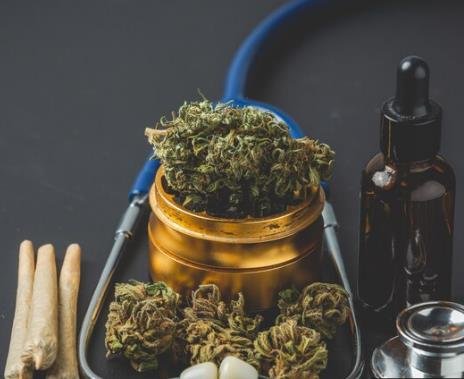Despite overwhelming public support for medical marijuana in Indiana and a recent statement from Governor-elect Michael Braun signalling it’s time to legalize, top Republican lawmakers in the state remain staunchly opposed to the idea. As the debate over cannabis reform intensifies, these divisions underscore the complexity of marijuana policy in the state.
Senate President Rodric Bray and House Speaker Todd Huston are vocal critics of medical marijuana, even as Braun calls for reform.
GOP’s Reluctance Amid Growing Public Support
Indiana’s top Republican lawmakers are digging their heels in on the issue of medical marijuana. Senate President Pro Tem Rodric Bray made his opposition clear during a recent law firm panel in Indianapolis, stating, “It’s no secret that I am not for this.” He questioned the medical benefits of marijuana, claiming that the states which have legalized it for medical use often end up legalizing recreational marijuana as well.
Bray’s comments reflect a broader skepticism within the Republican establishment in Indiana. His claim that he’s yet to see “compelling medical cases” to support legalization mirrors the doubts raised by House Speaker Todd Huston. Huston, who has been just as firm in his opposition, called marijuana a “deterrent to mental health” and added that he believed some lawmakers backing the reform are simply motivated by the prospect of boosting state revenue.
Both Bray and Huston made it clear that they are not in favour of medical marijuana legalization based on financial gain. Bray expressed his discomfort with what he sees as “bad policy” if the sole motivation for passing such laws is revenue generation.
Despite these arguments, public support for medical marijuana in Indiana is overwhelmingly high, with recent surveys showing that nearly 9 in 10 adults in the state are in favour of the reform. The divide between the Republican leadership and public opinion could set the stage for further tensions as lawmakers approach the new legislative session.

Governor-elect Braun Signals Support for Change
Governor-elect Michael Braun’s recent comments, however, stand in stark contrast to those of Bray and Huston. Braun, who has a history of voicing support for medical marijuana, told local reporters that “it’s probably time for it to have found its way to Indiana—on the medical side.” He pointed to national trends and the overwhelming public support for medical marijuana legalization, noting that 70 percent of voters in earlier polling supported the reform.
Braun’s endorsement marks a significant shift in the conversation around cannabis policy in Indiana. While he was previously cautious during his tenure as a U.S. Senator, Braun’s stance has now evolved to align more closely with public sentiment. His position reflects the views of many of his constituents, who see legalizing medical marijuana not only as a way to improve access to therapeutic treatment but also as a way to modernize Indiana’s approach to healthcare and wellness.
Braun’s comments also reflect broader shifts in the national political landscape, where growing acceptance of medical marijuana has become a mainstream issue. For example, he pointed out that all four of Indiana’s neighboring states have already legalized medical cannabis, further highlighting the pressure on Indiana to follow suit. Michigan, Illinois, Ohio, and Kentucky have all taken steps toward medical marijuana legalization, with Michigan and Illinois also allowing recreational use.
For Braun, the move to medical marijuana seems to be a logical step forward in addressing the state’s health and economic needs. He recently mentioned that the “smartest method” would be to look at how other states, particularly those bordering Indiana, have implemented medical marijuana programs successfully.
The Divide: Lawmakers vs. Public Opinion
The opposition from Bray and Huston stands in stark contrast to the views of the public and many medical professionals. A recent survey by Ball State University found that 62 percent of Hoosiers support both medical marijuana and adult-use cannabis legalization, while another 25 percent support only medical marijuana legalization. In total, nearly 87 percent of residents are in favour of some form of marijuana reform, suggesting that Indiana’s political leadership is out of step with its citizens on this issue.
As Senate Minority Leader Greg Taylor pointed out during the Dentons Legislative Conference, Indiana risks falling behind neighbouring states that have already moved forward with medical marijuana programs. This growing divide between lawmakers and public opinion is likely to spur continued debate in the state legislature, with advocates for reform pushing to hold elected officials accountable to the voters they represent.
While the economic argument for legalizing medical marijuana has been a sticking point for some Republicans, others see it as a critical opportunity to provide relief to patients and revitalize the state’s healthcare system. Despite the resistance from key Republican figures, there is increasing pressure on Indiana lawmakers to move forward with the will of the people.
What’s Next for Indiana’s Cannabis Debate?
As the 2024 legislative session approaches, all eyes will be on the debate over medical marijuana in Indiana. With Braun’s support, proponents of medical cannabis are hoping to see the issue addressed in the upcoming legislative session, especially given the fact that so many neighboring states have already taken action.
However, the opposition from figures like Bray and Huston will likely keep the issue in the spotlight for the foreseeable future. If the divide between public opinion and legislative action continues to widen, it could spark a significant shift in how marijuana policies are viewed within the state.
This situation highlights the ongoing tension between progressive public opinion and conservative political leadership, a challenge faced by many states across the country as they navigate the complex issue of marijuana legalization.



